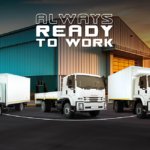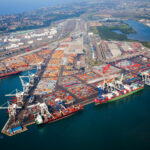Bah humbug! Transnet ruins Xmas… and SA too
Bah humbug! Transnet ruins Xmas… and SA too
It’s Christmas! But instead of saying “Ho, Ho, Ho,” another expression springs to mind: “Bah humbug!”
Bah humbug is, of course, the phrase most famously used by Ebenezer Scrooge, the cold-hearted miser who despises Christmas, in Charles Dickens’ A Christmas Carol. It’s become synonymous with anyone putting a damper on Christmas – which is precisely what Transnet is doing.
As Ian Pettey writes on page 40 of this issue of FOCUS, there’s a mounting backlog of 70,000 containers in Durban – and many of these containers hold goods intended for Christmas sales. While messing up Christmas is a travesty, the demise of Transnet also has more serious consequences. As naamsa | The Automotive Business Council has pointed out, the current logistical challenges at South Africa’s ports and across the country’s entire freight rail network are impacting vehicle production and new vehicle sales.
“The current challenges will soon have a devastating domino impact on the entire auto value chain. Our erratic logistical challenges will become the single biggest risk for the sector should we not urgently address many of the leadership and systemic structural challenges experienced by Transnet. The sector’s productivity relies heavily on infrastructure investment, sustainable energy supply, and the revitalisation of SA’s ports, rail, and road. A conducive framework is crucial to support these critical elements,” it states.
These warnings have come at a time of panic, after it was (falsely) reported that Volkswagen was leaving South Africa. The reports followed a Reuters interview with Thomas Schaefer, Volkswagen’s CEO of the VW Passenger Cars brand. He said that he was “very worried” about the future of the company’s South African operation, which – like all companies operating in this country – is fighting persistent power cuts and logistics snarls. Schaefer pointed out that logjams on railways and at ports have eroded the country’s competitive advantage.
While Volkswagen is staying (for now), ArcelorMittal South Africa has announced the closure of its operations in Newcastle and Vereeniging, starting from January 2024. This will put 3,500 jobs on the line.
Once again, Transnet is partially to blame. “The problems around Eskom and Transnet will unlikely change in the near term. We also do not see a change in the economic dynamics of South Africa,” Kobus Verster, the CEO of ArcelorMittal South Africa, told journalists.
“The dysfunction and unreliability of Transnet’s rail network have meant that ArcelorMittal is transporting raw materials to its factories by road, which is more expensive. ArcelorMittal relies heavily on Transnet Freight Rail to transport 91% of the iron ore and 100% of the coking coal consumed at its Newcastle and Vanderbijlpark factories to produce steel. The shift to road as a direct result of Transnet inefficiencies has cost ArcelorMittal losses amounting to more than R1 billion just in 2022,” the Daily Maverick has reported.
Meanwhile, as ArcelorMittal made its shocking announcement, things were going a bit pear-shaped back at the Port of Richards Bay. Thanks to the demise of the country’s rail network, trucks have to transport coal to the port, resulting in a lot of traffic. Transnet came up with a genius suggestion: to ban trucks from the port.
Gavin Kelly, CEO of the Road Freight Association (RFA), quite rightly said this decision was ludicrous (I concur). “No, Transnet – the answer is not to close the Port because you cannot efficiently and sustainably do the work required. You are killing the country!” he proclaimed.
There was – understandably – widespread condemnation of the ban, and lots of finger pointing and heated debate followed. Things got so bad that, on 23 November, Cyril Ramaphosa visited the Port of Richards Bay “to assess the state of the port and efforts underway to address congestion”. (Actually, the effort underway was to ban trucks).
On the day of the visit, Vincent Magwenya, Ramaphosa’s spokesperson, issued a very upbeat and optimistic statement, proclaiming that “government has made the efficiency of the logistics system a core priority, as a necessary condition for job creation and growth”. Furthermore, he revealed that the Transnet Board “has developed a recovery plan aimed at improving operational performance and stabilising Transnet’s finances over the next six to 18 months”. He confidently stated that reforms at Transnet “will fundamentally transform South Africa’s logistics system in the long term, restoring its performance to world-class standards”.
Of course, we all know that it will take a lot more than recovery plans to resurrect Transnet… it will also require truckloads of money. It therefore came as no surprise to learn – a mere week later – that government was planning to bail out Transnet to the tune of R47 billion.
The RFA’s Kelly has greeted news of the bailout with what can be best described as cautious enthusiasm. “Whilst this is heartening, Transnet has received allocations and presumably bailouts from Treasury before. The question still remains whether the management, operational foresight, and control that was required for many years will now come into play,” he points out. “It has not done so before – so the question is whether this will ‘suddenly’ now happen – or are we to see a similar experience as happened with South African Airways, where countless bailouts occurred without the desired result.”
Dr Juanita Maree, CEO of the South African Association of Freight Forwarders, sees the bailout as good news. “The R47 billion facility guarantee is a development we welcome, as it may indeed activate the recovery of Transnet and in due course aid the positioning of an efficient, fully functional multimodal logistics system in the near future,” she says.
Maree stresses that the Transnet recovery plan is vital to the national economy. “The current infrastructure crisis and service incapacity at the ports is of material proportion, severely impacting national and international players in our economy. We see the action as the start of building blocks for a transformed logistics system where the private sector and Transnet will collaborate to the benefit of all in South Africa,” she maintains.
Let’s hope Maree is right. Our fabulous columnist, Nick Porée, doesn’t think she is. “R47 billion isn’t enough to make much of a difference. Transnet’s debts are standing at about R130 billion and interest is R1 billion per month. The ports need about R40 billion, and the railways need R60 billion. A bailout isn’t the solution… privatisation is,” he insists.
In his novel, Dickens described Scrooge as “a squeezing, wrenching, grasping, scraping, clutching, covetous, old sinner”, which isn’t far from an accurate description of Transnet. But thanks to those three spirits (the Ghosts of Christmas Past, Christmas Present, and Christmas Yet to Come), Scrooge changed completely, and for the better.
Can the same thing happen to Transnet? Personally, I don’t think so. I reckon Porée is spot-on: privatisation is the only solution. But, as he says, “the ANC will not let go of the gravy train…”
Published by
Charleen Clarke
focusmagsa




